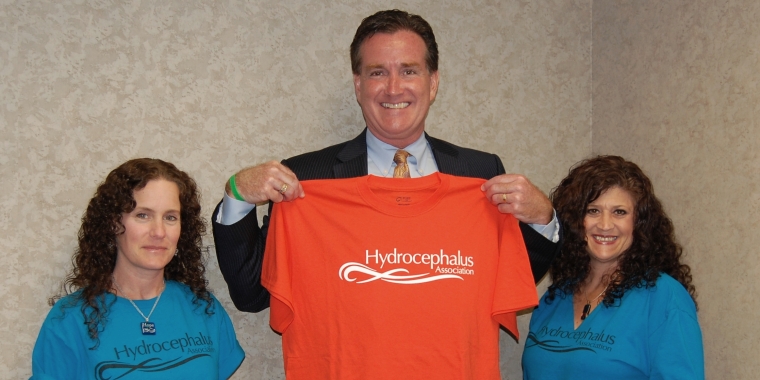
Senator Flanagan Joins With Local Residents To Raise Awareness Of Hydrocephalus
September 12, 2016
-
ISSUE:
- Hydrocephalus

To help raise awareness of Hydrocephalus and support the 11th Annual Hydrocephalus WALK, Senate Majority Leader John Flanagan (2nd Senate District) sponsored and passed a resolution designating the month of September as Hydrocephalus Awareness Month in New York State. Majority Leader Flanagan recently joined with Mia Padron and Jackie Davidson of the Hydrocephalus Association in his Smithtown office to raise public awareness about the upcoming fundraising walk.
Ms. Padron and Ms. Davidson are once again volunteering their time to coordinate this year’s walk, which will take place at 10:00 a.m. on Sunday, September 18th at Belmont Lake State Park in North Babylon. Residents can register or donate on the organization’s website at this link. Registration will also be available beginning at 8:30 a.m. on the morning of the walk.
All of the proceeds from the upcoming walk will benefit the programs of the Hydrocephalus Association, a national non-profit organization that provides support, education and advocacy to individuals, families and medical professionals dealing with the complex issues of hydrocephalus, as well as research to find a cure.
According to the two coordinators, the hope for this year’s walk is to continue increasing awareness and raising funding to help those afflicted with this incurable condition which is estimated to impact one in every 500 children.
“We applaud the efforts of Ms. Padron, Ms. Davidson and all the volunteers who work so hard to raise public awareness of hydrocephalus. This condition is unfamiliar to many people and their efforts to raise awareness and their dedication to helping others is greatly appreciated. We wish them all the best on September 18th,” stated Senator Flanagan.
Hydrocephalus, according to the Hydrocephalus Association’s website, is an abnormal accumulation of fluid inside the brain that affects over one million Americans of all age groups. The cause of the lifelong condition is unknown and the condition can occur at any age. The symptoms of hydrocephalus vary with age, progression and individual differences in tolerance to the condition. In an infant, the most obvious indication of hydrocephalus is often a rapid increase in head circumference or an unusually large head size.
Other symptoms may include vomiting, sleepiness, irritability, downward deviation of the eyes and seizures; and older children and adults may experience headaches followed by vomiting, nausea, papilledema, blurred or double vision, sunsetting of the eyes, problems with balance, poor coordination, gait disturbance, urinary incontinence, slowing or loss of developmental progress, lethargy, drowsiness, irritability, or other changes in personality or cognition including memory loss.
Most often, hydrocephalus is treated by surgically inserting a shunt system which diverts the flow of cerebrospinal fluid to another area of the body where it can be absorbed as part of the normal circulatory process.
About 40,000 shunt operations are performed each year in this country as standard treatment for this condition but due to the lack of advancement in treatment methods, many people with hydrocephalus are unable to lead full and productive lives.
For more information about the walk, please e-mail questions to longislandwalk@hydroassoc.org or call 631-255-4756.
Residents who would like more information about hydrocephalus should visit the Hydrocephalus Association’s web site at www.hydroassoc.org.
Share this Article or Press Release
Newsroom
Go to NewsroomSenator Flanagan Announces Funding For Area Groups
April 23, 2007
